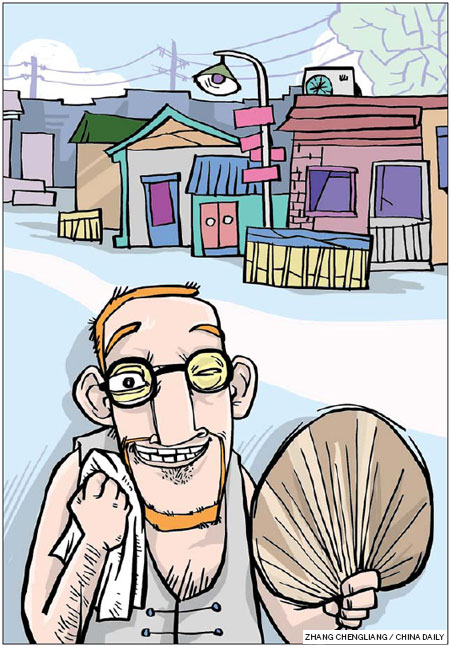Here come the 'hutongsters'

New breed of psuedo-stylish foreigners are giving us laowai a bad name
Forget the wrecking ball. Beijing's historic hutong need saving not from the demolition crew but from the ever-increasing number of Western hipsters who believe they are living the latest vogue.
You know the type I mean: they step off a plane, sign up for tai chi, yoga and qi gong looking for enlightenment before jetting off to a Buddhist retreat in India to find their inner 7-year-old. Sadly, more are staying in China, contributing to a new subculture that's as alarming as it is profoundly disturbing.
Meet the "hutongsters", as I call them. They're China's version of London's yuppies in the 1980s. They're direct descendents of homo sapiens and a close cousin of trustafarians, a name given to rich kids who live off daddy's trust fund while smoking marijuana all day with little desire to work in the real world.
A true hutongster has normally spent a "summer" working for a small NGO saving wombats in Africa and now works in the media industry harboring delusions that their memoirs of being the first trendsetter to live in a hutong will be original.
For some reason they believe living in sub-standard, poorly built squalor, which was literally thrown together with bare hands quicker than you can say the words "building code", is somehow a more authentic China experience. Most of the current small alleyways that crisscross the city were built for China's grassroots and are mostly devoid of the basic sanitary essentials of a toilet or shower.
This new breed of bourgeois often develops an identity crisis thumbing their nose to Sanlitun and the "foreigners" who fill the bars, clubs and restaurants. The irony here is their refusal to leave their kitschy neighborhood has led to a huge growth of Western-style bars, boutique stores and fancy European eateries opening in the hutong, turning them into pseudo-Sanlituns.
I had the displeasure of meeting one of the said species up close during a smoking break after dinner the other night. A young man in his late 20s, dressed in ratty brown khakis and a faded T-shirt from some US university I care less to remember. He had a very distinctive Californian accent and immaculate, straight white teeth. His lip brow wrinkled as he mused about how much he hated Sanlitun and how he rarely left his hutong existence.
Just then, a clash of plates could be heard crashing to the floor of the restaurant, prompting the white American to bemoan: "Oh, it must be a foreigner." To which I inquired: "What does that make you?"
I'm pretty sure hutong residents back in the 1950s didn't dream of one day going to the French butcher, calling into Hutong Pizza for a pepperoni special before trekking to Great Leap Brewery for a pint of stout. Rather, the area's longtime residents are more likely appalled by their morning shower in the communal bathroom being interrupted as two Sanlitun rejects vomit from the excesses of the night before.
Even the cover of Time Out magazine in Beijing this week heralded its guide to "Hidden Hutongs" (sic). The inside headline said it all: "We've gone hutong crazy!" Indeed. I swear one of these days I'm going to walk down Fangjia Hutong and see Bob from Birmingham dressed like a dan from Peking Opera, face-painted white, fan in hand while singing in a high-pitched voice similar to a drowning cat.
Like all latest crazes it will soon be a passing fad. The hutongsters will disappear into the sunset with their guitars and bongo drums silhouetted onto the cobbled streets they once called home in search of the next faux "authentic" experience.
We should start a rumor that the next playground of the nouveau riche is with Beijing's so-called mouse tribe, who live deep beneath the city in disused air raid shelters. Now that's really underground, man.
















